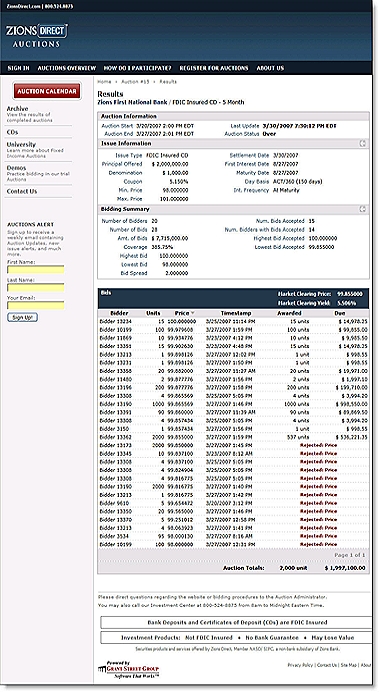 Several banks, including PNC in the bubble days and WaMu through eBay in early 2004, have tried auctioning certificates of deposit (see Online Banking #104). Those first attempts were aimed at retail depositors, an unlikely audience for a several reasons. First, the demographics of retail CD buyers is decidedly older and they tend to be fiscally conservative, not the right group for a new-fangled way to buy from the bank. On the other hand, CD auctions are a great way to introduce a bit of Web 2.0-style innovation into what is mostly a commodity.
Several banks, including PNC in the bubble days and WaMu through eBay in early 2004, have tried auctioning certificates of deposit (see Online Banking #104). Those first attempts were aimed at retail depositors, an unlikely audience for a several reasons. First, the demographics of retail CD buyers is decidedly older and they tend to be fiscally conservative, not the right group for a new-fangled way to buy from the bank. On the other hand, CD auctions are a great way to introduce a bit of Web 2.0-style innovation into what is mostly a commodity.
 So Zions Bank, through its Zions Direct division, has chosen a different path. Instead of creating an eBay-like environment for retail investors, it is using its non-bank investment division to sell CDs like the Treasury Dept sell t-bills. The certificates are sold at a discount to par, resulting in an acceptable yield for the bidders.
So Zions Bank, through its Zions Direct division, has chosen a different path. Instead of creating an eBay-like environment for retail investors, it is using its non-bank investment division to sell CDs like the Treasury Dept sell t-bills. The certificates are sold at a discount to par, resulting in an acceptable yield for the bidders.
Analysis
While PNC and WaMu's efforts were clearly just market tests that were shuttered after a few months, the Zions auction platform is full-featured. It appears to have staying power provided the bank is comfortable with the prices its paying.
Clearly, this is not a retail playground. There were 20 bidders making a total of 28 bids with a median bid dollar amount of just $10,000. However, there were three huge bidders, all playing with $2 million in cash, that set the final prices. Most likely it was someone in a large company treasury department looking to increase its yield on excess cash by a basis point or two.
But even though the big money sets the rates, the small depositors can still win since everyone received the same "market-clearing" rate. For example, four of the 14 winning bidders in the March 27 auction were small CDs of less than $5,000:
Winning bidders by size of deposit:
- 4 had $1,000 to $4,000
- 5 had $8,000 to $20,000
- 2 had $90,000 to $100,000
- 1 had $200,000
- 1 had $536,000 (partial fill of $2 million bid)
- 1 had $1 million (they also had non-winning $2 million bid)
It makes sense to set rates for large deposits this way. It mimics the way the capital markets already function. And it allows motivated smaller depositors to join the "action," receiving what they are likely to perceive as a fair price since it was set on the open market. Some day, the majority of CD dollars will be sold this way.
Finally, an added bonus for the first-mover, it positions Zions as innovative, fair, and looking out for its customers. The word of mouth and press attention should quickly pay back the investment Zions made in the platform.
More information:
——————————————————————————————————————-
Zions March 27 CD Auction Results
(see screenshot right or view archived page here)
Product: $2,000,000 in 5-month CDs
Bidders: 28 bids from 21 bidders
Final Price: 5.506% rate
Start date: 20 Mar 2007
End date: 27 Mar 2007 (6 PM EDT)
Discussion: Two $2 million bidders tied at the market-clearing rate, one ended up with a partial funding of $537,000 and one ended with zero, so had Zions made more money available, it could received total deposits of $3.6 million at 5.506% rate.